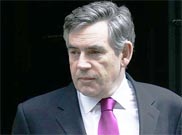It's all smiles again for Gordon Brown, British PM wins in crisis
 London - Gordon Brown is on a roll. No more gloomy poll news for the fingernail-chewing British prime minister who is said to be as authoritarian as Stalin and as accident-prone as Mr Bean.
London - Gordon Brown is on a roll. No more gloomy poll news for the fingernail-chewing British prime minister who is said to be as authoritarian as Stalin and as accident-prone as Mr Bean.
After governments around the world said "Yes prime minister" to Brown's bold bank recapitalization plan, the 57-year-old "dour Scot" can't stop smiling.
He even cracked a joke the other day, responding to the interruption of his speech by the ring of a mobile phone: "Oh, perhaps another bank has gone down."
Brown, considered a loser just a few short weeks ago when his Labour Party was in open rebellion and his wife Sarah strutted on to the party conference stage in killer heels to speak up for her husband, has been transformed by the global crisis.
Praise has been heaped upon him by Nobel Prize winners and top economists. In what must be the ultimate satisfaction, the US government even copied the "Brown plan," consisting of a mix of massive cash for banks, loan guarantees and strict conditions on lending and risk exposure.
Brown, brand-new US Nobel Prize-laureate Paul Krugman wrote, had "defined the character of the worldwide rescue effort, with other wealthy nations playing catch-up."
"Luckily for the world economy, Gordon Brown and his officials are making sense. And they may have shown us the way through this crisis," Krugman wrote in a column for the Guardian.
"Crises define politicians," the Financial Times intoned. "The contrasting fortunes of Mr Brown and President George W Bush illustrate the point... In crisis, both men's manners are transformed - one for the better and one for the worse."
While the accolades for the "hero of the hour," even called a "magician" by the exuberant French, continued to flow, Brown himself seemed tempted to exaggerate his role by placing it in the context of history.
Calling for a "new financial architecture for the global age," Brown appeared to put himself on a footing with wartime leaders Winston Churchill and Franklin D. Roosevelt who, he said, in the "heat of battle," had "taken steps to forge the reconstruction and peace that was to come."
While the world has sat up to listen, political commentators in Britain point out that Brown, a politician who only reluctantly accepted the European Reform Treaty and who single-handedly stopped the Euro from coming to Britain, has long called for leaders to focus their attention on global financial reform.
"But until this financial crisis brought the western economies to the brink of meltdown, no-one was listening," said one.
In the more sober - and cynical - environment of the British parliament, the praise for Brown has been mixed with warnings of the challenges still lying ahead.
This, said Conservative leader David Cameron, was not a "moment of triumph for the government," but the "bill for this painful end to the age of irresponsibility."
Liberal Democrat economics affairs spokesman Vince Cable, who last year coined the potentially hurtful phrase that Brown had changed from "Stalin to Mr Bean," reminded the prime minister that his impressive plan still had to stand the test of time.
"I hope that the government will not be carried along by hubris and excessive self-confidence and recognize that we are entering a period of recession," said Cable.
It was now time to show "as much sensitivity" to the many people likely to be hurt by the economic downturn as "has been shown to the banks."
It is a call bound to resonate with Labour leaders when times get tough, commentators believe.
"Shares, whether in banks or in Brown, can go up and down, and up and down again," said one. (dpa)